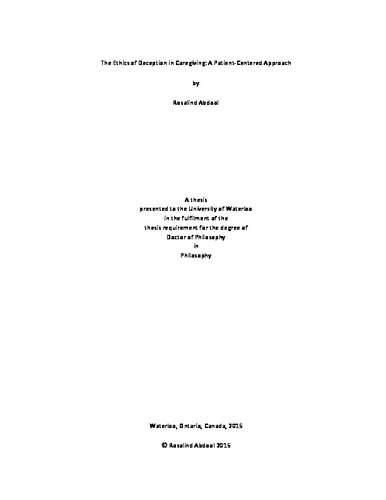| dc.description.abstract | Deception is a central issue in bioethics. This emerges most clearly when considering ways of assisting individuals who are incapable of making their own decisions. Deception can be defined as purposefully misleading another to think that something one believes to be false is true. Philosophically, it is a crucial question whether deception should be considered morally indefensible or morally defensible in different clinical scenarios. My dissertation is a novel approach to considering deception in caregiving and provides a new method for assessing when deception is either morally defensible or indefensible.
I ultimately argue that deception ought to only be used after considering several key morally relevant factors and that deception is prima facie morally indefensible. I argue that in very rare circumstances deception may be the most morally defensible alternative. These situations are often when a patient is significantly declining with no chance of recovery and there are no other plausible alternatives with a higher benefit-harm ratio in light of the morally relevant factors I explore. Other more rare circumstances include if there were significant chance of benefit to the patient, little chance of harm or risk and no other plausible alternative.
I develop an organizational framework and a clinical framework to help guide caregivers through the decision of whether it is morally appropriate to deceive a patient in unique circumstances. The organizational framework is designed to consider organizational limitations and conditions from which health care administrators can formulate policies on this issue. I argue that constraints on deception include: mental capacity, compliance with treatment (when applicable) and risk of significant distrust, and that necessary conditions include: significant chance of recovery, disclosure and controlled environments. I further developed a case-based (patient-centered) clinical framework, Embedded Specified Principlism (ESP). ESP is a modification of Beauchamp and Childress’ Specified Principlism (SP) and it is both practical for the caregiving environment and provides comprehensive moral justification for determining when and when not to use deception.
I consider several other bioethics models, including feminist bioethics and narrative ethics, and argue that these ought to be incorporated into ESP to highlight the importance of reducing stigma towards vulnerable/marginalized populations, fostering greater trust and other relationships between caregivers and patients and understanding the rich narrative of each unique patient. I further explore three major objections to traditional SP including arbitrariness, systematicity and casuistry and argue for two methods to reduce arbitrariness. On the basis of these arguments and the discussions of the morally relevant factors presented in my dissertation, I ultimately argue that deception in caregiving, although most often is morally indefensible, can be morally defensible in rare circumstances depending on the unique specifications of each patient’s experience. | en |

